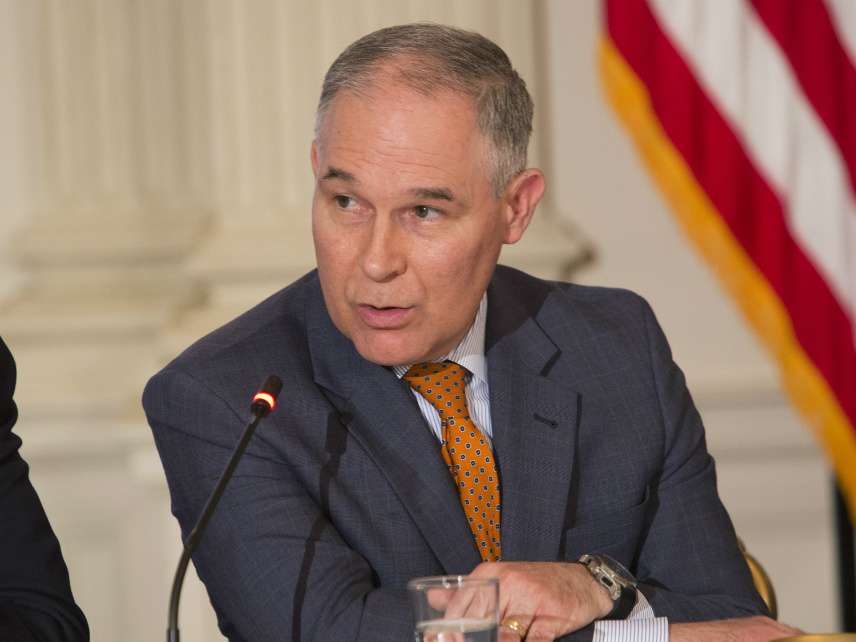Trump Administration Announces Rollback of Obama-Era Vehicle Emissions Standards
The new rules will likely lead to cheaper, safer vehicles.

In a widely expected move, the Trump Administration announced today that it would be rolling back stringent fuel efficiency standards imposed by former President Obama's Environmental Protection Agency (EPA).
Under the Obama-era rules, makers of cars and light trucks were expected to raise their average fleet-wide fuel economy to 54 miles per gallon by 2025. The current fleetwide average is 38.3 miles per gallon.
In a press release, EPA Administrator Scott Pruitt said that the Corporate Average Fuel Economy or CAFE standards that the Obama administration imposed "made assumptions about the standards that didn't comport with reality, and set the standards too high."
Pruitt also hinted that a waiver granted to California to impose its own even higher vehicle emissions standards was endangered, saying that "cooperative federalism doesn't mean that one state can dictate standards for the rest of the country." California's waiver is being "re-examined" according to the press release.
This weakening of CAFE standards has generated predictable backlash from Democratic lawmakers.
"The EPA is willfully ignoring the fact that these emission standards are working. Cars are becoming more fuel efficient and consumers are saving money at the pump," tweeted Sen. Diane Feinstein (D-Calif.).
"The Trump Administration's assault on clean car standards risks our ability to protect our children's health, tackle climate change, and save hardworking Americans money," said California Attorney General Xavier Becerra, who also threatened legal action to maintain California's own higher standards.
Free market voices, conversely, cheered the move while pointing out the downsides that the current CAFE standards have had.
"CAFE's lethal effects on vehicle crashworthiness were documented by analysts and a federal appeals court years ago," said the Competitive Enterprise Institute's Sam Kazman in a statement. "We hope that the Trump Administration will finally take account of those effects and start to liberalize this program."
One way automobile manufacturers have satisfied CAFE standards over the years is by reducing the weight and size of their vehicles. This Kazman argues, and federal agencies concede, makes vehicles less safe in crashes, leading to a greater number of automobile fatalities.
Julian Morris of the Reason Foundation—the nonprofit which publishes this website—has similarly argued that CAFE standards either increase price for consumers or otherwise require them to settle for vehicles that do not meet all their preferences.
"Since more fuel-efficient vehicles are more expensive, this means consumers are forced either to pay more for a vehicle with all the other attributes they want (power, speed, luxury, etc.), or purchase vehicles that lack some of those attributes. Either way, consumers are harmed by CAFE standards," wrote Morris in a recent report.
What the new CAFE standards will be has yet to be determined. Pruitt's press release said only that his agency and the National Highway Traffic Safety Administration will begin developing new, lower CAFE and greenhouse gas emissions standards.
Rent Free is a weekly newsletter from Christian Britschgi on urbanism and the fight for less regulation, more housing, more property rights, and more freedom in America's cities.


Show Comments (94)